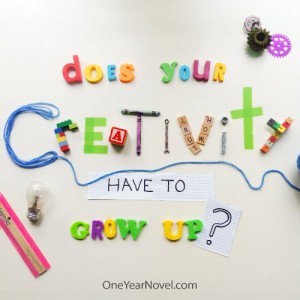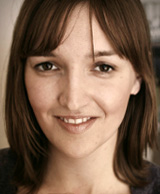Does Your Creativity Have to Grow Up?
by Tineke Bryson, Staff
 I was one of those kids who did not want to grow up. At all. I wasn’t merely cranky about it; I spent middle school leading a full-out rebellion against the invading tyranny of hormones.
I was one of those kids who did not want to grow up. At all. I wasn’t merely cranky about it; I spent middle school leading a full-out rebellion against the invading tyranny of hormones.
Started a club (of course) dedicated to complaining about growing up. It convened in the girls’ bathroom and may have been the only time I teamed up with my own gender. The times required desperate measures.
A particular incident in guerrilla warfare involved sneaking the 12th candle off my birthday cake before it was presented to me in class. One teacher had the audacity to call me out and laugh at me, and I got so offended I actually ran away from school.
I was convinced the day I turned 13—became a TEENAGER (shudder)—I would lose control of my will and morph into a makeup-caked automaton who did boring things like sleep in, use lipgloss, and fawn over boy bands.
I was also desperately concerned about losing my imagination.
I would give a lot to go back and tell myself:
There was no reason to feel powerless in the face of change.
Why am I sharing this with you?
Because life throws many changes at us. They threaten an end to our creative ambitions.
Whether it’s a job with no wiggle room for ideas, so much college homework you’re worried you’ll lose your love of reading, or a new life role (marriage, parenthood, anyone?), change has a way of making us feel like a naive idiot for calling ourselves a writer, an artist, an adventurer.
But the truth is: While change can turn our lives upside down, and hormones can take our bodies and emotions hostage—at age eleven or eight-and-twenty!—these things can’t touch our will.
Whatever culture tells you adulthood is about, giving up your ability to think outside of the box is not a requisite. It’s something people choose.
The Will Saves the Day
God gave us a will so we can use it, and it is much more influential than we think.
Don’t sell your will short. Don’t swallow perfectly refutable ideas about how boring your thought life should be.
1. Reject the Lie that Grown-ups Are Serious. My strategy facing the dreaded 13th birthday could be summed up as “hunker down and behave so maturely that adolescence takes you for dead.” I figured if I was losing the war, I would just skip being a teen altogether and graduate to adulthood. Stupid plan. I spent years of my life contriving a shriveled soul. Now I’ve rejected this lie, I am getting younger every year.
This truth can set us free: there is nothing down in God’s rule book about being serious all the time. The “blessed-are-those-who-mourn” and “better-go-to-the-house-of-mourning” passages in the Bible are about opening our eyes to see how much our lives and choices matter, not about building ourselves a hovel in the Vale of Tears.
2. Be Silly. Being deliberately solemn is not the appropriate response to the painful state of our world or the responsibility of being an adult. Actually, it’s incapacitating and results in its own kind of blindness: to possibility and hope. Instead, our grief and outrage should push us to gather up our courage and tease creative ideas out of the very worst situations. To laugh in the face of the demons of regret and despair. To play as though the sun won’t rise again on a more perfect opportunity for adventure.
3. Practice Difference. How do we expect to be free and creative thinkers when brainstorming novels if the rest of our existence is ordered out of our culture’s catalog?
Here’s a handy-dandy survey I rustled up for your squirming pleasure.
When was the last time you:
- cooked something no one in your circles would know the name of?
- painted a wall a bright color?
- filled up empty wall or floor space without recourse to Walmart, Target, IKEA, or Amazon?
- bought a fruit or vegetable you’ve never eaten and found a way to incorporate it into a dish?
- thought of a new use for something old (or new) without reference to Pinterest?
- took a road, on impulse, without any clear idea of where you’d end up?
- ordered dessert first?
- wore something people only expect from children (a hat with ears?)
- considered the toothbrush options in the kids’ aisle?
- gave a barista a made-up name?
- played lava on a playground (without bringing along a token kid)?
- made yourself a blanket fort and slept in it?
- built something with Lego?
Sorry, I haven’t got any four-letter acronyms to hand out based on your score. Just this piece of advice: Air out your imagination. Often. Imagine the world if you were Max instead of Joshua, a rabbit instead of a girl.
4. Make Sure You’re Asking Questions. One way to tell adults from kids is to note who asks questions. Isn’t that sad? I don’t mean questions like “Did you take the garbage out?” and “What’s the utility bill this month?” I mean the kind of can-opener questions that take a lot of imaginative muscle.
Lots of us adults gave up being curious long ago when we realized most questions don’t have happy answers. But original, imaginative ideas don’t come to those who resign themselves to platitudes.
Cover Story students start their magazine-writing journey recording 5 “Curious Questions” every day. This is a great way to stir up creative ideas at any age. Read this collection of questions they’ve asked, and see if it doesn’t push your imagination out the front door.
Pry the lid off of anything you wonder about. If your can-opener is stiff, get another one.
Remember this when changes lunge for the throat of your imagination: Your choices matter.
What do you do to keep your imagination spry? Comment on this post and tell us!
Tineke (TEE-neh-keh) Bryson grew up in West Africa. She was one of those kids who would raid the shed behind the backs of adults and build herself a fort on their carefully-tended lawns. Or start her own summer school to teach her friends to read. She wasn’t afraid of much. Except growing up. And telephones.
Now almost 30 and married, Tineke still champions the cause of imagination, and finds nothing as demanding or as satisfying as playing with words, whether by writing or editing.
Before working for Daniel and Carrol Schwabauer, Tineke studied creative non-fiction at Houghton College and then worked as an editor. Taking The One Year Adventure Novel class live last year gave her a lot of reasons to now try her hand at writing fiction.



